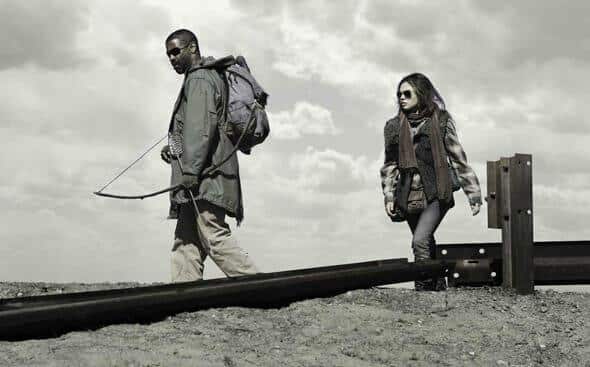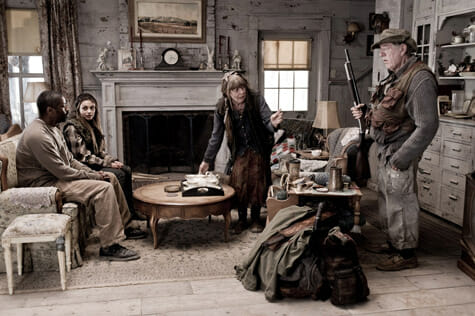The Book of Eli, starring Denzel Washington and Gary Oldman, is the kind of movie that can only be fully appreciated by first seeing it as a whole and then peeling back its layers and examining them one at a time.
The Story

Denzel Washington as Eli and Mila Kunis as Solara in Alcon Entertainment's action adventure film 'The Book Of Eli.'
Eli, played by Denzel Washington, is a man who can best be described as a violent pacifist on a mission, led by a “voice” he doesn’t fully understand but is completely devoted to. Like the prophets of old, he has taken what seems to be the last Bible on earth and carried it forth even when all the words don’t fully make sense to him. It’s been thirty years since what survivors simply call “the Flash”. Eli is making his way west, intent on carrying his precious cargo to a destination he doesn’t seem to be sure of himself. From the first scenes of Eli silently stalking an emaciated cat, and then conserving its fat as it is cooked on a spit, there is no doubt something terrible has happened to mankind. One scene after another is filled with freeways that dead end into piles of rubble, exposed girders, and lawless marauders, while what little remains of civilization teeters on the precipice of devouring itself.
How did the world get this way? Thirty seconds of dialogue in a two-hour movie is all we are given to offer a clue—and that is vague, discovered only through the remembrances of one man who has been walking west for thirty years since whatever ripped a hole in the sky happened. But one need only walk with Eli through the barren land that was once America and derive all the back-story that is needed. Something apocalyptic happened and everything changed. Anything more would have detracted from the effect.
The Hughes brothers, who returned Batman to his Dark Knight heritage nine years ago, have created a visually stunning and disturbing world. Cinematographer Don Burgess has created an effect in which the colors are almost drained from the landscape. It is a bleak world where barter is the only currency and untimely death the only certainty. This is a violent film, but even its carnage has a certain poetry to it. There’s a meter and rhythm to the way Eli avoids violence as much as he can, while at the same time effortlessly measuring out the right amount of force to squelch the evil around him.
A Warning
There have been plenty of apocalyptic tales told before The Book of Eli. From Planet of the Apes to all of the Mel Gibson, Mad Max movies, to Will Smith in I Am Legend, film makers have sought to capture what a world where calamity has consumed society might be like. But The Book of Eli does so with a subtly and yet stark clarity that will stay with the viewer for a long time.
Let’s begin with the disaster that left everything like it is. In many movies there is some kind of explanation from a character, the opening sequences, or flashbacks that give some clue what caused the world to go mad. Not in The Book of Eli. Everywhere we look we see remnants of a prior civilization, the one before the “Flash.” Eli tries to explain what he has come to know about the event thirty years prior, but admits no one really knows why it happened. All we know for sure is that man somehow tore a hole in the sky and brought disastrous, scorching light onto the Earth. From a survival standpoint what makes this movie so effective is its very lack of explanation for what has happened. The world that was, is now simply called “the before time.” Having lived through major hurricanes and experienced the hours of total disconnect from the outside world, this writer can only imagine what it would be like for an entire society to be so suddenly cut off.

Perhaps no scene in the movie better pictures the odd mixture of hopelessness and man’s determination to survive whatever the cost, than when Eli and his traveling companion encounter a couple that have somehow managed to make a normal life for themselves. The old couple lives in a house by themselves in the New Mexico wilderness, replete with a bit of a picket fence. They serve tea and enjoy music from an old Victorola record player. It is only when they come under attack that we discover the kind of fire power the couple possess. Later Eli notices the multiple graves behind the house and recognizes how the couple found food for so long after others ran out. It isn’t just society that has been devouring itself. Man’s cannibalism has brought with it madness beyond what most of us ever want to consider.
Hope
The most important layer of The Book of Eli has a beauty to it that seems impossible against the backdrop of a world gone to hell. Eli is heard whispering to himself on more than one occasion, “Stay on the path.” When asked where he has been heading for three decades, his only answer is, “west.” Eli is a man of faith carrying words that offer the only real hope once everything else has disintegrated. To tell you more about how that plays out would be a disservice to you as a viewer. While the world around him blusters, and swears, and steals, and kills, Eli quietly remains focused on restoring some semblance of humanity everywhere he goes.
So what can we learn from this tale? Perhaps it is more real than many would care to imagine. Look back at New Orleans in the days after Katrina and tell me how quickly civil order disintegrated. Look at those who claim to have faith in God and tell me how many would stay on the path if the world went mad around them. The thing is, some of us wonder if the madness hasn’t already begun to break out, like a hole torn in the sky.
If you liked this article you may be interested in this product from our sponsor.

 Off The Grid News Better Ideas For Off The Grid Living
Off The Grid News Better Ideas For Off The Grid Living
